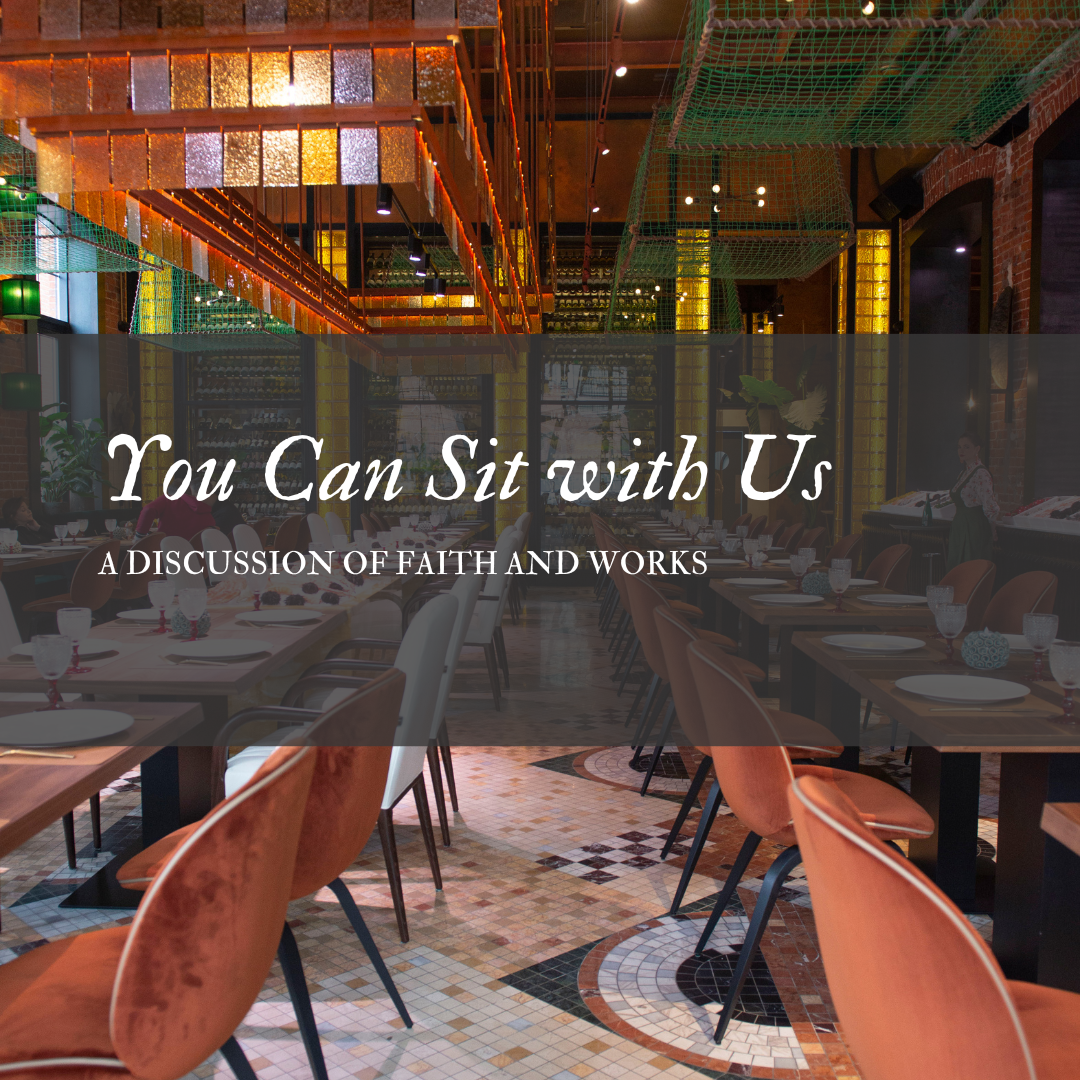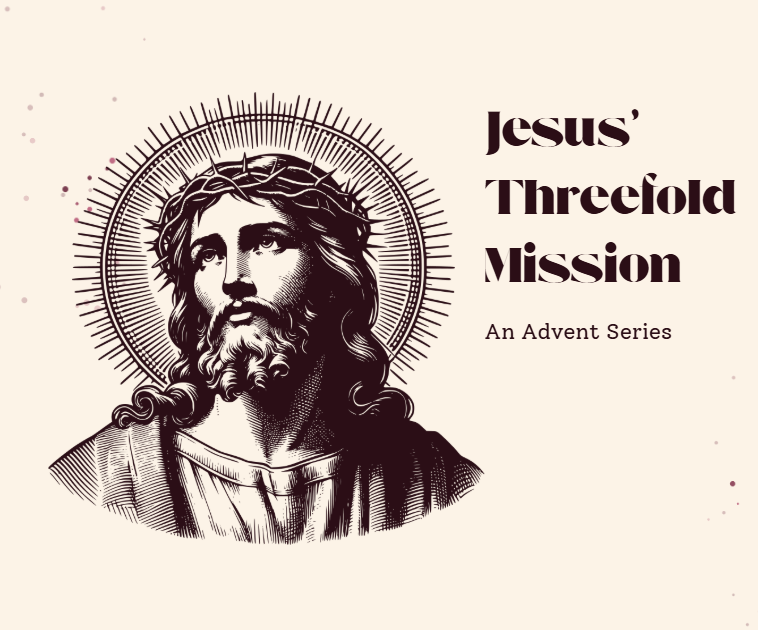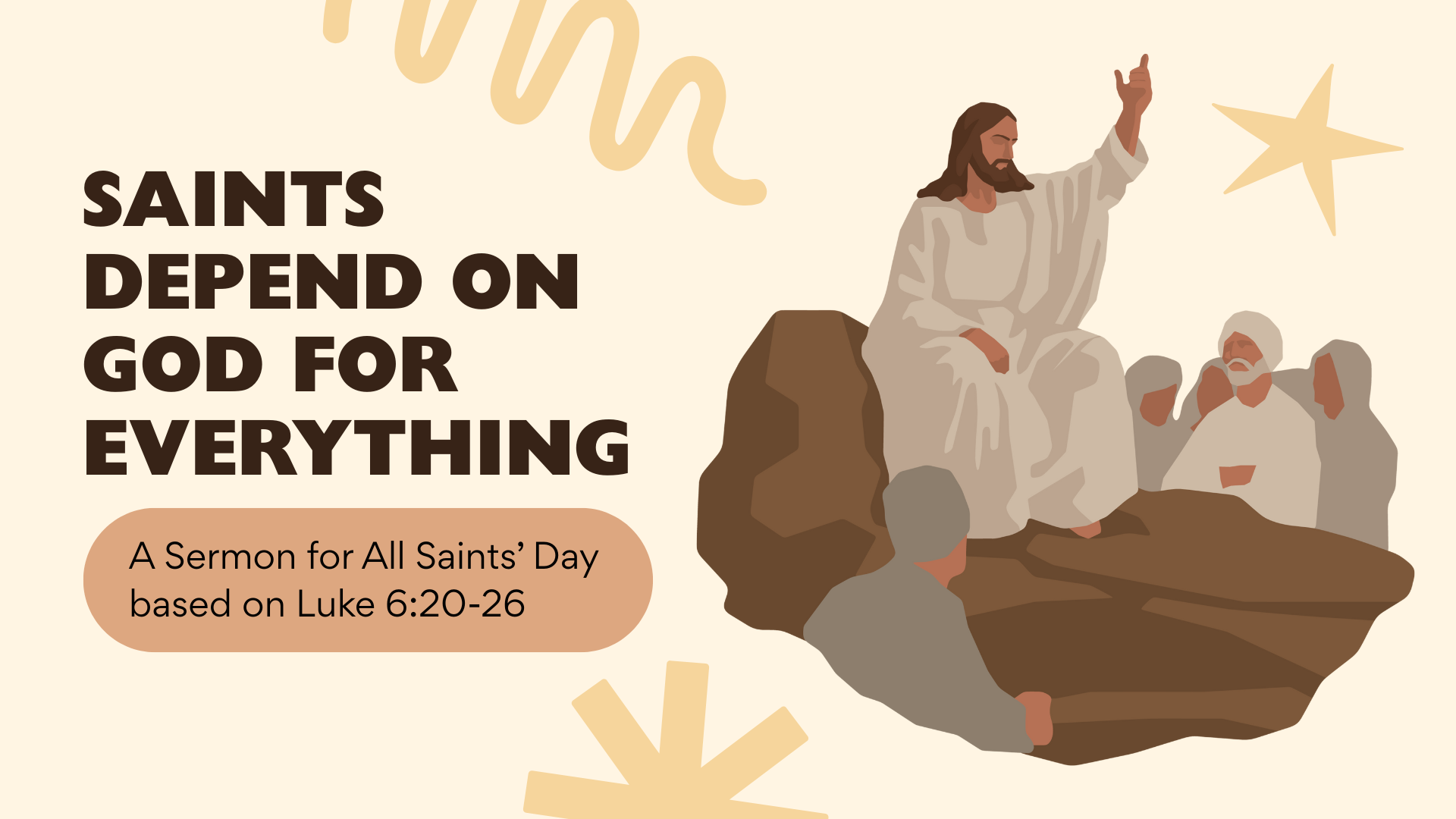"You Can Sit With Us" A Discussion of Faith and Works

This devotion accompanies themes that have been studied in the previous week’s Sunday morning Bible class. Over the next few weeks, join us at 9am on Sundays at Trinity for the following discussions!
A high school cafeteria can be a scary place. More than just a place to find nourishment for the second half of the school day, one’s behavior in the cafeteria is governed by unwritten rules and invisible forces. Getting a tray of food is not the hard part, but what happens after. Where you park that tray of room-temperature pizza and baby carrots is the most important thing you do in that cafeteria – in the eyes of the rest of the students, anyway. Where you sit says a lot. Whom you can or should sit next to is thoroughly scrutinized.
Apparently, the religious group known as the Pharisees had not outgrown this adolescent obsession with such scrutiny. Mark records for us that they were viciously critical of Jesus for no smaller a reason than the people with whom he chose to sit and eat. “Why does he eat with tax collectors and sinners?” they asked (Mark 2:16). Jesus sat with the lowest of the low – the social outcasts.
Jesus knew he would fall under that kind of criticism. He sat with these people intentionally. He wanted to show by a simple but friendly gesture of sharing a meal that the love and forgiveness he came to bring is for everyone. He replied to his critics, “It is not the healthy who need a doctor, but the sick. I have not come to call the righteous, but sinners” (Mark 2:17). In other words, if you catch Jesus showing love to people who don’t deserve it, good! You are noticing why he came in the first place. Since all have sinned and fall short of the glory of God, all need to be justified by God’s grace. Thanks to Christ, we are (Romans 3:23). We are saved by God’s grace alone (Ephesians 2:8).
So everyone is going to heaven, then, right? Because Jesus came to save all people from their sins (1 John 2:2) why isn’t everyone’s relationship with God restored? John 3:16 says, “For God so loved the world that he gave his one and only Son,” so doesn’t that mean we are all saved?
That Jesus has done the work of justifying the whole world (Romans 3:23), of reconciling the world to God through his sacrifice (2 Corinthians 5:18-19), of atoning for all sins (1 John 2:2), is an objective fact. But don’t forget how the most famous verse of the Bible ends: “For God so loved the world that he gave his one and only Son, that whoever believes in him shall not perish but have eternal life” (John 3:16). Faith is the gift of God (Ephesians 2:8) that connects you to the work Jesus accomplished for you, summarized by the term “gospel” (Romans 1:16-17).
But what even is faith, and how do we get it? Faith is confidence (Hebrews 11:1). It is trust (2 Corinthians 4:8). Faith is as simple as looking at Jesus and saying, “That’s my Savior!” (John 3:14-15). “Faith” is another way of talking about the trust-relationship with God that flows from understanding that he has saved you from all your sins (Psalm 13:5-6).
In Bram Stoker’s Dracula, the titular vampire is only able to enter the homes of those who willingly invite him in. A lot of people think that’s how Jesus works, too. But clearly, in the sinful state we inherit, we are incapable of inviting him into our hearts. Before this trust-relationship with God happened, we didn’t know God nor wanted to (Romans 1:21), and if we did, we would have opposed him with all our might (Romans 8:6-7, see also Ephesians 2:1). So clearly, if it were up to us to make this relationship with God happen, we have no chance. We are too far gone on our own to accept God into our own hearts or make a decision to follow and trust in him.
But Jesus barges into our lives and wins us into his kingdom by his love. He makes a home of our hearts through his glorious gospel (Ephesians 3:16-19), freeing us from our sin-darkened minds by showing us the light of his love and grace. He does this through the gospel (Romans 10:17, Romans 1:16,17). Through the gospel itself, Jesus changes our hearts from enemies of God to his trusting children; from spiritually dead to spiritually alive; from dreadful objects of wrath to heirs of eternal life (Romans 9:9-11,14-17).
This is how much God loves you: not only does he forgive you your sin, but he uses the message of your forgiveness to breathe the breath of life into your heart, so that you are now able to rest secure in him. The reason some aren’t going to heaven is not because Jesus didn’t die for them. Nor is it because God doesn’t want them to be saved (1 Timothy 2:3-6). It is because of their own rejection of the gospel (John 3:17-20).
Do you have to understand all 66 books of the Bible in order to be saved? Do you have to be able to explain deep theological concepts? Or is it just enough to know the name of Jesus? The key word to remember here is “trust.”
As soon as a baby emerges from the womb, she trusts in her mother. A severely disabled patient trusts the compassionate nurse that attends him. Trust does not depend on intellect. The kind of trust we’re talking about is a spiritual thing, not just an intellectual thing. Remember that Jesus described saving faith as simply looking to him and thinking, “That’s my Savior” (John 3:14-15). A baby, a double PhD Philosophy professor, or a fourteen-year-old struggling to find his way through freshman year are all capable of relying on the goodness of God to save them.
If I’m saved apart from anything I can do to earn or deserve it, and the faith that I have in my heart didn’t get there by my decision or inviting it in, but is a gift from God, what kind of life am I supposed to live?
You will notice that Scripture answers this question very thoroughly, but if we forget what has been said previously, we’ll miss the point. Yes, God has plenty of things to say about the kind of people we should be, but remember that you are different now. Now you have been changed, taught by God himself to rely on him for all goodness, for love, for salvation, and for his strength – apart from anything you can do (Ephesians 2:8-9).
Scripture’s encouragements for how we should live can be summarized this way: “Live as the person you now are.” I wish we had more time to discuss this. For now, see Ephesians 4:1-6, Ephesians 5:1-10, Romans 8:1-17. There are many other passages, but those will be a great start. When Jesus sat with the tax collectors and sinners, he loved them despite their sinful failures. He showed his forgiveness, and then would have explained how to live in the light of that forgiveness (see the example of Zacchaeus in Luke 19:9-10).
We would love it if you joined us as this conversation continues in our Bible class at 9:00am every Sunday morning. We also would love to hear from you on this or any topic, so please get in touch with us!
God bless you with rest, knowing that your relationship with him is secure in Christ. May God give you guidance and courage to live out that relationship every day!
Pastor Mike Cherney







